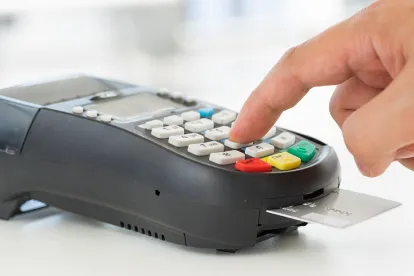On January 25, the CFPB finalized certain changes to the original Final Prepaid Rule (the “Rule”) proposed last summer. The amended Rule still contains onerous restrictions on credit features and complicated disclosure requirements, but the changes are generally positive for prepaid providers and incorporate feedback from industry representatives. Importantly, due to concerns about implementation difficulties, the effective date of the Rule, which was originally October 1, 2017 and delayed to April 1, 2018, is now further delayed to April 1, 2019.
The changes reverse two controversial aspects of the original Rule, and make several other changes:
-
Error Resolution and Limitation of Liability. One of the original Rule’s most controversial mandates required error resolution and limited liability protections for unregistered accounts (e., accounts that have not concluded the verification process, accounts where the process is concluded but the consumer’s identity could not be verified, and accounts in programs for which there is no such verification process). Acknowledging “financial institutions’ fear of fraud losses,” the CFPB changed the Rule to no longer require financial institutions to resolve errors or limit consumers’ liability for unregistered prepaid accounts until after a financial institution successfully completes its consumer identification and verification process. Notably, the Rule differs from last year’s proposed changes by not requiring financial institutions to limit liability or resolve errors that occurred prior to verification on accounts that are later successfully verified. If no verification process is available, financial institutions must disclose to consumers the absence of, or limitations on, such protections.
-
Digital Wallets. The amended Rule also narrows the definition of “business partner” under Regulation Z to clarify the Rule’s application to digital wallets and to alleviate burdens for digital wallet providers. Under the amended Rule, business arrangements between prepaid account issuers and issuers of traditional credit cards are excluded from coverage under the Rule’s hybrid prepaid-credit card provisions as long as
-
the prepaid card cannot access credit from the credit card account during a prepaid card transaction without written consent to link the two accounts,
-
the acquisition or retention of either account is not conditioned on whether the consumer authorizes such a connection, and
-
the parties do not vary certain terms and conditions based on whether the two accounts are linked.
Deviating from last year’s proposal, the Rule now permits digital wallet providers to run negative balances when a covered separate credit feature offered by a business partner is attached to the digital wallet as long as the following requirements are met:
-
the digital wallet cannot access credit from the covered separate credit feature that is offered by its business partner;
-
the digital wallet provider has a general policy and practice of declining transactions that will take the account negative (at least outside of the situations involving incidental credit); and
-
the digital wallet provider generally does not charge credit-related fees.
These changes do not completely exclude digital wallets that can store funds, or person-to-person (“P2P”) payment products from the Rule, but it does ease compliance burdens on digital wallet providers that allow consumers to link their debit and credit cards and to store and access funds.
-
Loyalty, award, and promotional gift cards. The amended Rule clarifies that loyalty, award, or promotional gift cards that are not marketed to the general public are not covered by the Rule, regardless of whether they provide disclosures under the Gift Card Rule.
-
Unsolicited Issuance. Regulation E provides that a financial institution may only issue an access device for an account to a consumer on an unsolicited basis in accordance with certain requirements. The original Rule raised questions about how the unsolicited issuance rules applied where the consumer is given no other option but to receive the disbursement via a prepaid account, such as prison release cards, jury duty cards, and certain types of refund cards. The amended Rule provides that, under such facts, the financial institution can comply with the unsolicited issuance rule by informing the consumer that there is no other way to access funds in the prepaid account if the consumer disposes of the access device.
-
Pre-Acquisition Disclosures. The CFPB finalized changes that provide additional flexibility regarding the pre-acquisition disclosures mandated by the Rule:
-
If there are no alternative means for the consumer to receive funds from a prepaid account (other than a payroll card account or government benefit account), pre-acquisition disclosures may be provided at the time the consumer receives the prepaid account.
-
The original Rule required financial institutions to provide a long form disclosure after a consumer acquires a prepaid account at a retail location. The amended Rule provides that financial institutions may deliver the long form disclosure after acquisition without E-Sign consent, as long as it is not provided inside the prepaid account packaging material, and the financial institution is not otherwise mailing or delivering to the consumer written account-related communications within 30 days of obtaining the consumer’s contact information. The amended Rule does not require a financial institution to provide the long form disclosure if it has not obtained the consumer’s contact information.
-
Under the amended Rule, if a financial institution provides pre-acquisition disclosures in writing, and a consumer subsequently completes the acquisition process online or by telephone, the financial institution need not provide the disclosures again electronically or orally.
-
Financial institutions disclosing additional fee types with three or more fee variations are now able to consolidate those variations into two categories and allow those two categories to be disclosed on the short form.
-
The amended Rule clarifies that foreign language pre-acquisition disclosures for payroll card accounts and government benefit accounts are not required where the foreign language is offered by telephone only via a real-time language interpretation service provided by a third party.
-
Submission of Agreements. To reduce compliance burdens, the amended Rule makes several changes to the original Rule’s requirements requiring submission of prepaid account agreements to the CFPB:
-
Issuers may delay submitting a change in the names of other relevant parties to a prepaid account agreement (such as employers for a payroll card agreement) until the earlier of: (a) the time the issuer submits an amended agreement or changes to other identifying information; or (b) May 1 of each year, for any updates to the list of names of other relevant parties that occurred between the issuer’s last submission of relevant party information for that agreement and April 1 of that year.
-
Short form and long form disclosures may be provided as separate addenda to the agreement, rather than integrated into the agreement or provided as a single addendum.
With the announcement of these changes, the CFPB provided an Executive Summary of the amended Rule, and an unofficial redline of the changes.
The preamble to the amended Rule states that the CFPB will submit a report to Congress pursuant to the Congressional Review Act (“CRA”) containing the Rule and other required information, and also states that this is not a major rule under the CRA. Because the Senate did not previously reject the Prepaid Final Ruleunder the CRA, and because the amended Rule contains a lot of concessions to industry participants, we think it’s unlikely there will be a significant push for the Rule’s rejection.



 />i
/>i

